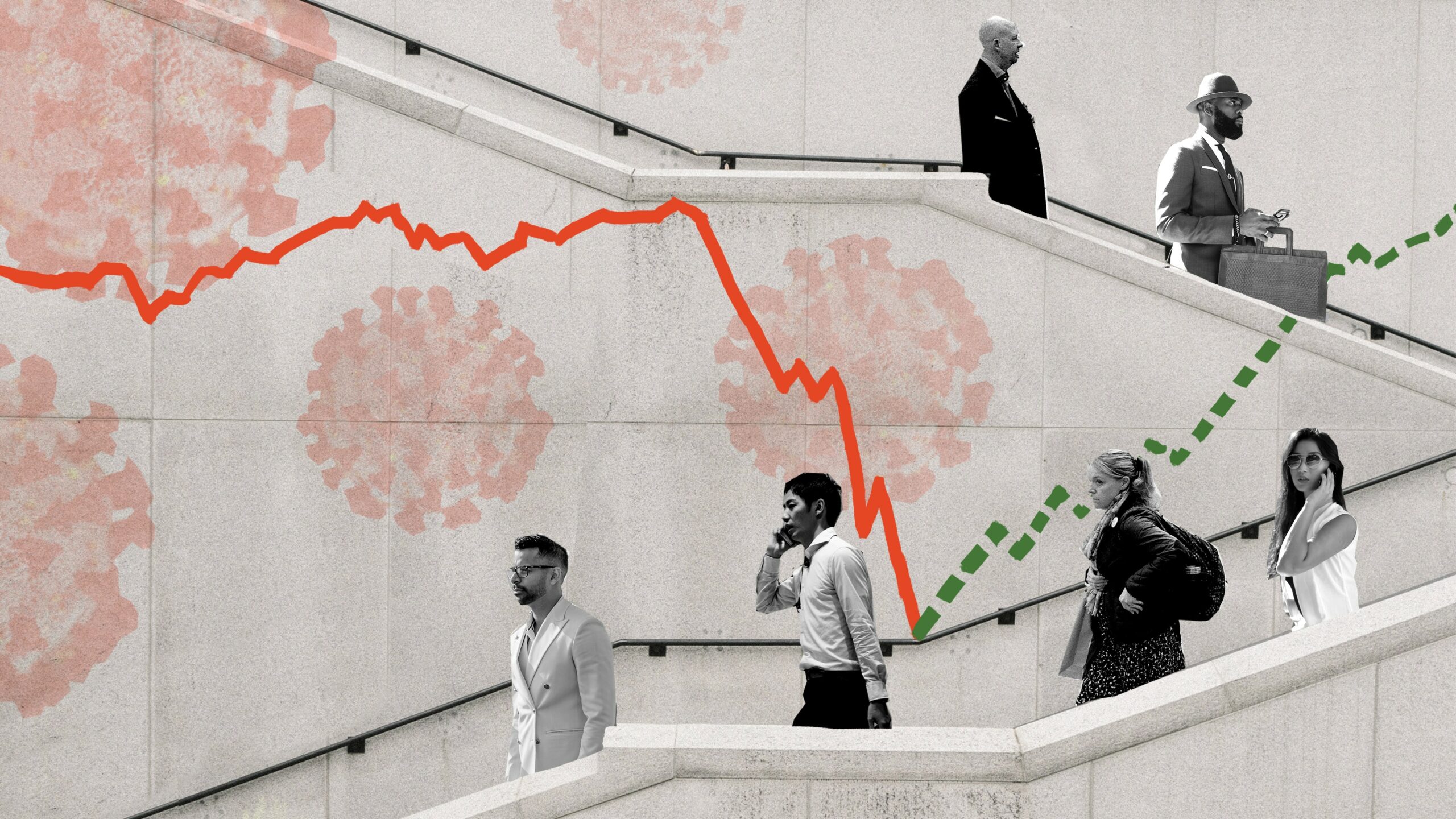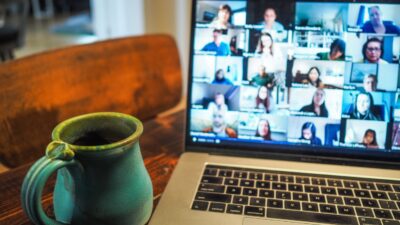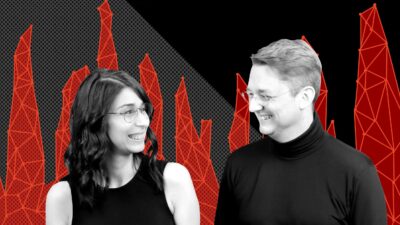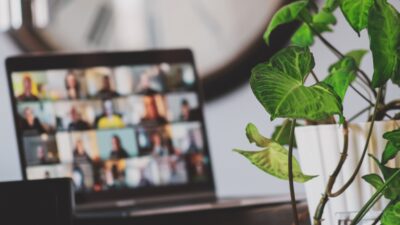Sandra Peter and Kai Riemer

Motivation on Corona Business Insights
Why are workers experiencing higher levels of fatigue and stress and what strategies can be used to increase motivation?
As COVID-19 sets out to change the world forever, join Sandra Peter and Kai Riemer as they think about what’s to come in the future of business.
Shownotes
Professor Vince Mitchell on coping with being captive at home
Professor Maree Teesson and Dr Lexine Stapinski from the University of Sydney’s Matilda Centre discuss how to cope psychologically, emotionally, physically and economically with the pandemic
Research on framing change and innovation as a chance to experiment
Keeping your team motivated, remotely
University of Southern Queensland mood profiling online
The reason everyone’s feeling exhausted (and women the most)
Employees say they are burned out as a result of working from home
Our discussion around the four-day work week
This episode is part of a podcast series covering what COVID-19 will mean for the business world, where we look at the impact on the economy, businesses, industries, workers and society. This is part of our ongoing coverage of the impact of COVID-19 on the future of business.
Follow the show on Apple Podcasts, Spotify, Overcast, Google Podcasts, Pocket Casts or wherever you get your podcasts. You can follow Sydney Business Insights on Flipboard, LinkedIn, Twitter and WeChat to keep updated with our latest insights.
Send us your news ideas to sbi@sydney.edu.au.
Dr Sandra Peter is the Director of Sydney Executive Plus and Associate Professor at the University of Sydney Business School. Her research and practice focuses on engaging with the future in productive ways, and the impact of emerging technologies on business and society.
Kai Riemer is Professor of Information Technology and Organisation, and Director of Sydney Executive Plus at the University of Sydney Business School. Kai's research interest is in Disruptive Technologies, Enterprise Social Media, Virtual Work, Collaborative Technologies and the Philosophy of Technology.
Share
We believe in open and honest access to knowledge. We use a Creative Commons Attribution NoDerivatives licence for our articles and podcasts, so you can republish them for free, online or in print.
Transcript
This transcript is the product of an artificial intelligence - human collaboration. Any mistakes are the human's fault. (Just saying. Accurately yours, AI)
Intro From the University of Sydney Business School, this is Sydney Business Insights.
Sandra And this is Corona business insights. I'm Sandra Peter.
Kai And I'm Kai Riemer
Sandra And with everything that's happening, it's been difficult to understand what COVID-19 might mean for the business world. So in this series, we've been unpacking its impact on business, the economy, industry, government, workers, and society and looking at the effects of the pandemic.
Kai And this podcast is, of course part of a larger initiative by the University of Sydney Business School. Our COVID business impact dashboard is a living initiative, which we constantly update with insights and resources from our academics from industry experts, Nobel Prize winners and movers and shakers
Sandra And you can find all of these resources online at sbi.sydney.edu.au/coronavirus.
Kai And today we talk about the impact of the COVID-19 pandemic on motivation.
Sandra Okay, how motivated are you to do this?
Kai I am very motivated. Let's do this.
Sandra So most of us are still continuing to work from home, work remotely, we haven't been back to our respective offices in months. And for many of us, including in many places in Australia, this is the reality for quite a while to come. And this has meant for many people that they're starting to feel less and less motivated when every day looks like the day before. They're experiencing anxiety, they're experiencing burnout, significantly higher levels of fatigue than before the pandemic, and an overall lower level of motivation.
Kai So we have previously talked about the challenges to productivity from remote working and this is really the flipside of this the individual perspective of feeling overwhelmed of not getting a handle on getting your day organised, and generally feeling a level of burnout and this can have many causes that can either be being overwhelmed by the big picture by the grief of a loss of lifestyle of Being able to go to the office and having the pandemic hanging over you like a big shadow. But it can also be related to working too much. We've previously mentioned that in the US studies, which say that workers work up to three to four hours more per day when they are working from home. And indeed, there's a study out of the US and we put it in the show notes, which reports that 69% of employees who work from home report signs of burnout so it's a really severe problem that can stem from overworking or from the anxiety induced by the pandemic itself.
Sandra And of course, it can be big things that induce stress and anxiety and lead to loss of motivation, like the uncertainty about how long this pandemic will take place or uncertainty around one's work or employment or around the looming economic recession. But it can also be induced by the monotony of doing the same thing every day. Getting up, going to work in one's home office and going through the same motions every day. But what happens after a month of remote work is that this results in a low-grade stress that never really goes away, which induces a level of anxiety and lack of motivation that doesn't really have a relief.
Kai And we know from neuroscience studies that when our brains react to a threatening situation, cognitive resources are appropriated to deal with the threat. But in the pandemic, many people find themselves in this constant low-grade stress where the threat doesn't really go away. And we'll put an article from Wired in the shownotes where this is discussed, but the idea here is that people can be in a constant low-grade alert state that then impedes other higher cognitive processes like concentration, memory, collaboration, creativity, and so in this scenario, it is really important to break out of this situation and regain a sense of routine and normalcy.
Sandra And whilst we've seen increases in levels across the population, the University of Southern Queensland, for instance, keeps a mood barometer in their In The Mood website where people talk about how they're currently feeling, and they've seen a significant increase in fatigue across the board compared to before COVID-19. But there are also significant differences here between how different people experience this. For instance, women have been reporting significantly higher levels than men, especially young women have reported feeling most tired. However, there is research to show that women are more able to recover their resilience after extended periods of stress, whereas men are better at coping with really acute stressful events, but need long recovery times otherwise.
Kai And so the question that we want to ask is, what can we actually do? And we found a few resources that we're going to put in the shownotes around how to actually break out of the situation individually, but more importantly, what managers, what teams can do to regain motivation in this situation. And really what we want to say it's like a V-shaped form. It's a two-step process where first of all, we need to break out of the paralysis that is induced by the grief of a loss of lifestyle and the threat of the pandemic, to regain some sense of routine, and then reclaim a sense of purpose and big picture. And so, on the first step, we put in the shownotes, an article written by one of our professors at the business school, Vince Mitchell, who has a few strategies around what individuals can do to deal with the grief, the anger, the anxiety, to vent stress, to socialise with people in similar situations to really kind of cope with the mental stress from the situation. And then move back into an orderly work life that resembles a new routine, not necessarily just a version of what you do in the office, but at home.
Sandra And this first part of the V really has to do with trying to reduce negative motivators. So trying to reduce things like emotional pressure, or the economic pressure that people are feeling and trying to reduce the inertia that has set in, where people are wondering what's even the point of doing all the things that they are doing.
Kai And so we're putting an article in the show notes from HBR, where negative and then positive motivators are contrasted. They're mentioning three positive motivators play, purpose and potential. And by successively increasing those three, we're moving our way out of the V shape into a positive teamwork environment. So 'play' refers to the idea that the work itself should be enjoyable. So rather than overloading people with lots of work that earns dollars for the organisation, risking burnout, risking overworking people, it's about finding routines that in a team are enjoyable and then increase productivity. We've discussed in the four-day work week episode that sometimes less work hours will actually make people more productive. So this is where the team will work on finding ways of working that work in a remote work situation, that are new and can be different from how work was organised before moving to the situation.
Sandra And then there's of course, 'purpose' and 'potential'. On the one hand finding 'purpose' in the work that one does, working together with a team that is visible that has a clear impact on your own work on the work of colleagues or on customers. and 'potential', the ability to know that you can grow in your job, that you can learn new things that you can develop, that there is more that can be done.
Kai And so the authors of this article make the point that once you've regained a sense of routine, really what is important is to bring the team back into the purpose of the enterprise, involve them into finding reasons for why they're here, and involving them in the process of bringing the organisation out of the pandemic and into a new world.
Sandra But still, during the pandemic, this is much easier said than done. With play, it's much more difficult to do this when working from home. The joy of figuring things out with a team or with colleagues is not as easy when they are all in different locations. Purpose also goes down with the fact that quite often what we do is not visible to our managers or to the larger team, the perception of potential can decline because the opportunities to gain access to insights from mentors or from colleagues or seeing other people work on difficult problems is not there anymore. So the question then is, what can we actually do to improve these positive motivators? And as we discussed before, reduce the things that negatively impact motivation. And one way to achieve this is through experimentation.
Kai So really, there is no one size fits all solution for every team. And so the idea is to bring the team members into the process of creating, not only their own work environment, but also bringing them into experimenting with the big picture of the organisation.
Sandra Whilst experimentation itself can actually lead to an improvement in motivation, because a lot of experimentation can actually feel like play, like a space that is safe where we work with others to collectively solve a new problem. It also allows people to discover maybe new ways of getting motivated.
Kai And so we want to point out here that the situation of many businesses and organisations during this pandemic becomes mirrored in how we deal with team motivation. During the pandemic it's really about coping with the crisis, finding new ways of making money, new ways of working. We've seen restaurants adapting their business models, teams need to adapt their ways of working, they need to find new forms of play, so to speak. But as we move forward, as we come out of the pandemic, businesses will have to adapt to a new situation in the market that is only emerging, only unfolding. So this adaptation is best done in a form of experimentation, which can be mirrored at the team level, but where teams and team members can also be brought into this experimentation process, and be made part of the purpose of the organisation. Therefore, giving them motivation that goes beyond just their own individual tasks, their own individual work day, where it's often difficult to find reasons to go out of bed and put yourself through the daily grind. So really, the idea is to bring team members into this process.
Sandra And of course, being able to get out of bed and finding the motivation to start your morning is important, and there are very basic steps that everyone can take to ensure that they have a structure to their day, that there is a difference between where life is and where office is in the house. And we'll include in the shownotes seminar that discusses some basic strategies for coping with this from experts from the University of Sydney's Matilda Centre, but creating spaces for experimentation within organisations can create intrinsic motivation.
Kai And this goes to the point mentioned in the HBR article that these intrinsic motivators are much stronger than any of the external ones like emotional or economic pressure. So really what team leaders wanted to do is tap into those intrinsic motivations.
Sandra And also make sure, and there is research around this that we'll include in the shownotes, also make sure that the chance to experiment is framed not as merely a chance to improve performance, but an opportunity in itself, an opportunity to change and to innovate.
Kai So really what we're saying is that once teams regain a sense of routine, the organisation can actually killed two birds with one stone, not only use experimentation and bringing team members employees into the enterprise of adapting the organisation to a new emerging work, but also to tap into their collective intelligence, their creativity, their ideas, to potentially adapt the business model of the organisation, and find new ways to survive and indeed thrive in what is as yet an unknown world post-pandemic.
Sandra And this is where we want to leave it. This has been Corona Business Insights. Thanks for listening.
Kai Thanks for listening.
Outro From the University of Sydney Business School. This is Sydney Business Insights, the podcast that explores the future of business.
Close transcript





